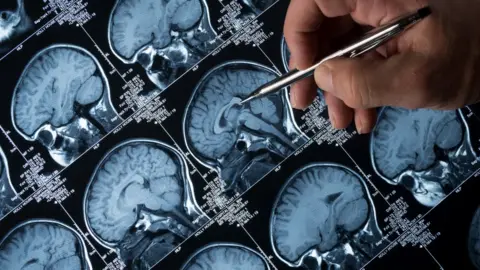How your driving might reveal early signs of Alzheimer's
 Roe Lab
Roe LabEveryone's driving changes as they age. But for some people, subtle differences emerge in how they control a vehicle, which scientists say are associated with the early stages of Alzheimer's disease.
In an experiment to find out whether these driving differences can be detected using Global Positioning System-based (GPS) location-tracking devices, a group of over-65s in Missouri in the US agreed to have their driving closely monitored for one year.
The DRIVES Study at Washington University in St. Louis, led by Catherine Roe and Ganesh Babulal and funded by the National Institute on Aging, wanted to find out was whether just studying the driving habits of this group alone could reveal the start of the disease - without the need for invasive or expensive medical procedures.
After 365 days accumulating the information, they are confident that it could.
Among the 139 people involved in the study, medical tests had already shown around half of them had very early or "preclinical" Alzheimer's disease. The other half did not. Analysis of their driving revealed detectable differences between the two groups.
Specifically, those with preclinical Alzheimer's tended to drive more slowly, make abrupt changes, travel less at night, and logged fewer miles overall, for example. They also visited a smaller variety of destinations when driving, sticking to slightly more confined routes.
 Getty Images
Getty Images"How people move within their daily environments, ranging from the places they visit to how they drive, can tell us a lot about their health," says Sayeh Bayat, a PhD candidate at the University of Toronto, who led the study.
GPS trackers fitted to the participants' cars revealed these movements, and when they occurred, in detail.
The researchers running the study had previously split their participants into those with preclinical Alzheimer's disease, and those without, using medical tests such as spinal fluid tests and positron emission tomography (PET) scans.
But using the results of the driving data, they were able to design a model that could forecast someone's likelihood of having preclinical Alzheimer's using merely their age and their GPS driving data. It proved to be 86% accurate.
"Using these very few indicators… you can really, with very high confidence, identify whether a person has preclinical Alzheimer's disease or not," says Ms Bayat.
The model was more accurate still (90%) when it also added in the results of a genetic test for Alzheimer's known as apolipoprotein E (APOE) genotyping that indicates whether you may have an inherited risk for the disease. (Although it's worth bearing in mind this group only represents some of the people who eventually go on to develop Alzheimer's).
But the prediction based on age and driving alone was almost as precise.
 Roe Lab
Roe LabLarger, randomised studies are needed to show a definitive link between the detected driving behaviours and preclinical Alzheimer's disease.
However, the potential game changer here is that this could be a low-cost way of detecting the condition at an earlier stage, potentially supporting treatment. But it also raises the question of whether older people would want their behaviour to be tracked so closely, even if there were health benefits.
The fact that people's driving behaviour changes when they have Alzheimer's is well documented. The US National Institute on Aging says family members might eventually notice that their loved one is taking longer to complete a simple trip, has been driving more erratically, or gets muddled over which pedal is which, for example.


Yet it is tricky to detect the more subtle changes, such as regularly driving more slowly, early on. That distinction, says Ms Bayat, requires gathering data over time for detailed analysis.
She adds that participants in the study with preclinical Alzheimer's would, in some cases, drive less at night, restrict their driving to slightly smaller areas around their home or travel more slowly than expected.
The best way to predict, via driving data, whether someone without preclinical Alzheimer's could be at risk of developing it might be to monitor their road use over a longer period of time. That would be likely to reveal changes in their driving, says Ms Bayat.
Laura Phipps at Alzheimer's Research UK says the study is "really interesting", adding that changes in driving behaviour are often noticed by family members of a person who is later diagnosed with the disease.
 Alzheimer's Research UK
Alzheimer's Research UK"What they'll say to us is, often one of the first symptoms or signs that they noticed is that their loved one started… to get lost," says Dr Phipps.
She says there are currently relatively few drugs available to treat early Alzheimer's disease, but she hopes this will change in future. If this were the case, then having an early indication of who is likely to develop the condition - without the need for costly or invasive procedures - could help doctors know when to prescribe treatments.
"Research has shown that, actually, the disease can start in the brain up to 20 years before symptoms show," she says.
Insights from driving or other behaviours such as changes in how people speak could also prompt lifestyle changes that might help to keep Alzheimer's at bay. The UK's National Health Service advises that taking care of your cardiac health while also remaining socially and mentally active are among the preventative measures people can take.
The idea that analysis of the way you drive could help people manage and potentially even delay the start of more severe Alzheimer's symptoms sounds tantalising. But there is always the possibility that errors could creep into this analysis. Or that the results could have negative consequences.
Many drivers of all ages already allow their insurer to use telematics or a black-box to monitor their driving, which can result in a lower insurance premium. But in the future could such devices accurately predict your risk of Alzheimer's and take that into account as well?
Although this potential scenario is a long way off for the insurance market, it's something that might worry existing owners of black boxes who have already experienced issues with their devices' accuracy in the past.
Rhoda Au at Boston University argues that customers should have more control over where their data goes in general, to avoid unfair discrimination of their habits or behaviours. "They should have the right to decide what does and does not get shared," she says.
 Rhoda Au
Rhoda AuShe jokingly notes that her own driving could be viewed as erratic: "I'm just thinking, like, God, these people at Google must think I'm nuts… I have no sense of direction."
Prof Au says that, in general, new data gathering systems designed to find subtle correlations between behaviour and medical conditions are likely to have flaws. But given the potential benefits of being able to identify people at risk of developing Alzheimer's disease early on, there is good reason to carefully explore those possibilities now.
"You have to start somewhere," she says.
